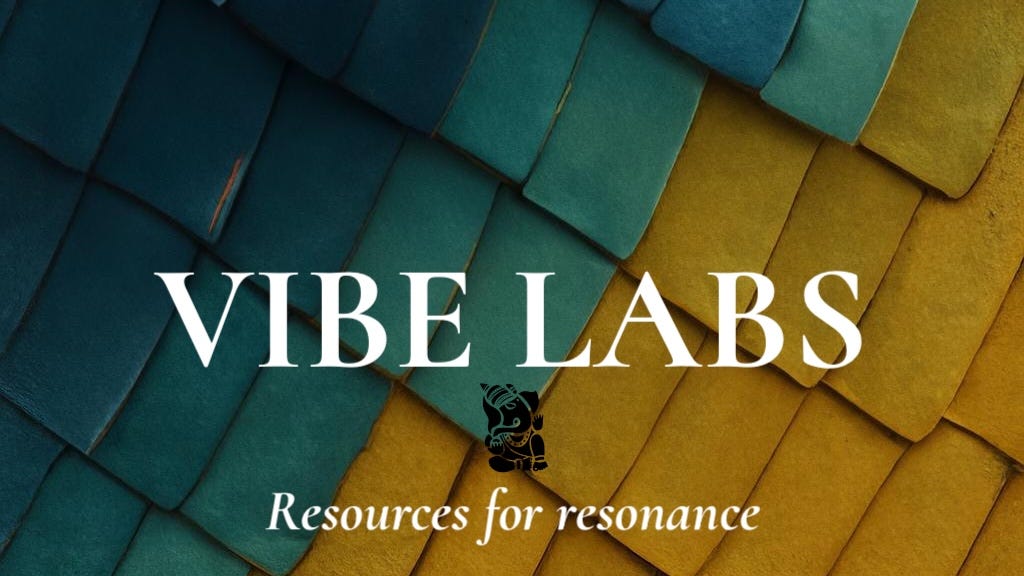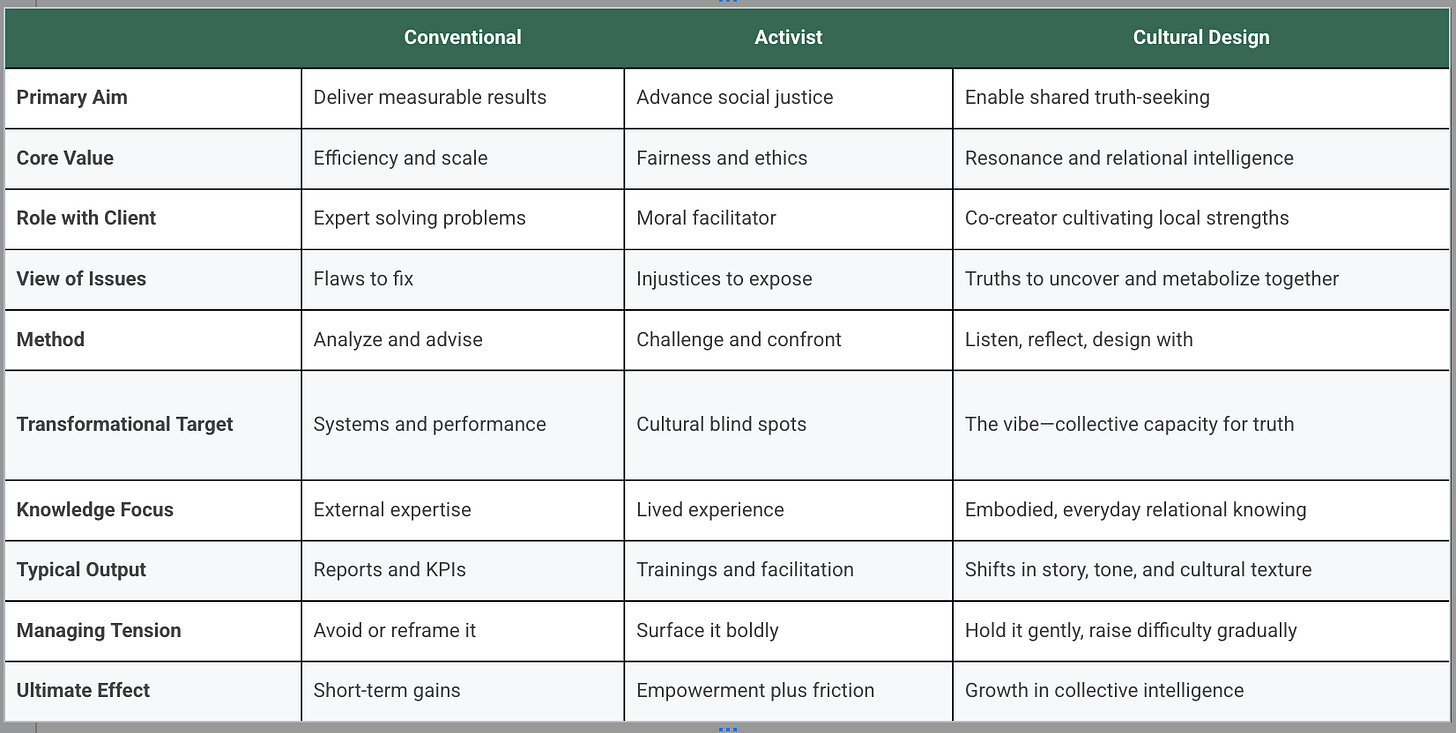Global Consulting in the Service of Resonance
VIBE LABS's vision statement.
It is a loosely kept secret that management consultancy, overall, hasn’t worked in quite some time.
These days, the end results of consulting projects tend to be unclear, educational efforts miss the mark, core values work is disconnected from the lived realities of coworkers, DEI programs are often counterproductive, corporate responsibility can look like greenwashing, and leadership development rarely turns out better leaders.
As research has revealed for over a generation—and as consultants themselves often admit anonymously or after leaving the field—the work is frequently described as empty, as hot air and buzzwords, as input for corporate politics, or as an expensive stack of presentation slides. The most profitable parts of the industry tend to be in the realms of mergers, lobbying, and tax planning—services which often benefit the few at the expense of broader society and the planet.
Can we, the consultants, become more than cogs?
Management consulting is so large and powerful that it now generates over a trillion dollars globally each year, growing at about 9% annually—significantly faster than the global economy. In the U.S. alone, the industry brings in more than $370 billion, over a third of the global total. The average consultant’s revenue sits at $212,000 as of 2024.
It’s time to ask what we are getting for all that money. Consulting costs more than what the U.S. spends on police, corrections, and courts combined. The average working-age American spends just under $1,300 per year on law enforcement—while consulting costs nearly $1,800 per working adult, indirectly, through the economy. The EPA, by comparison, is funded at under $50 per adult. With what we spend on consulting, you could fund over 36 EPAs.
With consulting's expertise supposedly imparted to leaders and industries worldwide, we might expect serious progress in leadership quality, sustainability, resilience, business ethics, stakeholder value, and long-term profitability. But such progress hasn’t materialized. Many signs point in the opposite direction.
Most damningly, malpractices and ethical lapses at top consulting firms continue to surface. At present, this massive industry too often does more harm than good.
Asking the Hard Question
Let us begin by asking a naive but necessary question: Why is this the case? How can a sector grow so fiercely while its reputation deteriorates—even among its own practitioners?
Given the scale and persistence of the phenomenon—disappointing outcomes paired with striking revenue growth—the answer must lie at a fundamental level.
Here is our answer to the conundrum:
Global consulting still sells “results” and “impact.”
What counts as “real results” is defined according to established assumptions within an organization and its culture.
Because organizations are structured around invisible limitations, only relatively superficial and quantifiable goals tend to count as “real results.”
Corporate culture often disconnects people from one another, from clear thinking, and from genuine emotion.
This results in stunted agency: organizations can generate billions and still act blindly, without truly thinking or feeling together.
In other words, consulting succeeds at growing because it fits seamlessly into the corporate logic of today’s economy. And it fails for the very same reason.
Corporate logic, as we define it, is the dynamic between people that focuses on transactions: what each party gains, and how agreements can be simplified and repeated. This logic drives efficiency at scale—but disables other vital ways of relating.
What, Then, Could Hit the Mark?
Our claim is that consulting can—and should—be redesigned to enable, rather than disable, sincere processes of truth-seeking: efforts to discover the plain or hidden truths of an organization’s challenges, tensions, limitations, and unrealized potential.
Unflinchingly accessing truths—not only as facts, but as the unspoken emotions and off-record insights of the people involved—allows interactions to begin striking the right note. Because now, something meaningful is being addressed. Actual concerns are being met. Real hopes and doubts are being heard.
When the right note is struck, organizational life begins to chime like a bell. This is what we call resonance—or more casually, good vibes. You know it when you feel it. Not in individuals, but in shared moments and how people show up for one another within them.
Good vibes don’t come from positive thinking, motivational speakers, or mindfulness breaks. They emerge from the sensitive and precise attunement of people to one another and to the realities they face. Resonance arises when people sense something that is true and feel empowered to act on it. This is the foundation of agency, and of cultural transformation. But it all begins with enabling truth-seeking.
Under such conditions, difficult issues become reachable: social tensions, inequalities, workflow inefficiencies, ethical doubts. This is only possible when an organization can hold what we call the truth about the truth.
That is: organizations can only carry and respond to as much challenging, complex truth as their cultural fabric allows. Too much, too fast, and the organization fragments. This is why corporate culture often defaults to the lowest common denominator.
The status quo disables truth-seeking. Consulting should enable it.
Our Stance: The Right Vibes Can Harness the Creative Strength of the Elephant in the Room
There is always an elephant in the room. But the elephant is not, as we’ve been taught, a threat to harmony—it is an untapped source of momentum and creative potential. With the right vibes, you can invite the elephant in, befriend it, and unleash its power.
Like the Hindu deity Ganesha, the elephant symbolizes wisdom, new beginnings, and the ability to clear obstacles. It’s not a problem to be solved, but a partner in transformation.
There are two levels to this work:
The quality of truth-seeking itself—how accurately you’re able to see the organization.
The truth about the truth—how emotionally and socially prepared the culture is to handle what it sees.
Without the first, you never reach the real issue. Without the second, you can’t respond. When vibes are wrong, even the truth can become destructive. When vibes are right, even the hardest truths can become transformative.
This is why problems persist despite best efforts. The elephant runs the show until we learn to greet it properly.
Is More Activism the Answer? Perhaps Not.
For over a decade, the default response has been to fuse activism with consulting. DEI, CSR, sustainability, and similar efforts have emerged as ways to address organizational blind spots by bringing moral urgency and external pressure.
But this approach has had limits. At best, it complicates relationships and creates tension. At worst, it is co-opted by corporate logic and becomes yet another set of rituals to be performed.
Activist-consultants have brought vital knowledge and sincere intentions. But they have often entered with their own perspectives and goals, rather than beginning with the needs and truths of the organization itself. The result can be friction, blurred roles, and diminished trust.
Instead of importing agendas, we propose something more grounded and generative: a process of context-sensitive truth-seeking, followed by carefully calibrated design interventions that reshape the organization’s cultural fabric.
Too much truth, delivered too bluntly or too soon, often backfires. It destroys trust, overwhelms systems, and creates backlash. That’s the truth about the truth. It is also the truth about therapy, about healing, and about change.
Cultural Design for Collective Intelligence
At VIBE LABS, we take up the core challenge of contemporary consulting—and respond not with new slogans or surface-level interventions, but with what we call Cultural Design.
We don’t offer quick fixes or mass-produced solutions. We offer something slower and deeper: an ongoing, supported process of truth-seeking, resonance-building, and emergent cultural transformation.
We begin by sensing the culture, improving its relational field, and offering tools for resonance. From there, we begin to go deeper, always matching the truth to the organization’s capacity to hold it.
Cultural Design increases a team or organization’s ability to understand, reflect upon, and ultimately co-create its own local culture. The results are not just improved performance metrics, but social resilience, trust, long-term ethical consistency, creativity, and what we call collective intelligence.
This doesn’t eliminate bias or resolve inequality overnight. But it builds the capability to face such issues together, over time, with nuance and maturity.
The Three Forms of Consulting
In Summary: New Methods in Consulting, for a World in Resonance
Once upon a time, consultants met the challenges of their age. Through the turn of the century, they helped transform rigid bureaucracies into nimble, digital-first enterprises. They brought analytical clarity to industrial complexity. They earned their fees.
But today, the challenge is different. The world is more connected, faster-moving, more emotionally complex. Our problems are systemic and interpersonal. Our people are more psychologically aware and expect more meaning from work. In this new context, consulting is once again in a position of unique opportunity.
With personal client relationships and global reach, consultants sit at a leverage point: uniquely positioned to help organizations – and thus the world – evolve. But the method must change.
We believe that consulting is currently too constrained by corporate logic to support sincere truth-seeking and resonance. And while activism-based consulting has brought insight, it has not transformed the deeper patterns.
Cultural Design offers a third path.
It is not a playbook, but a methodology. A way of coordinating practices, listening deeply, naming what is true, and cultivating the cultural readiness to respond to that truth. At its best, it makes the elephant playful. And in doing so, it makes your organization more itself: more aligned, more adaptive, and more alive.
Imagine if the trillion dollars spent on consulting each year went toward cultivating organizational coherence. Toward building our collective ability to face difficult truths—and respond creatively.
Most of our global challenges are self-inflicted. They can only be addressed through shared, emotionally intelligent, socially attuned truth-seeking. This is hard work. It is human work. And it must begin with deep respect for how fragile—and how powerful—truth really is.
At VIBE LABS, we believe consultants can be stewards of this transformation. Without discarding past wisdom or critique, we can realign our practices to serve resonance, coherence, and life.
Our vision is simple: a global consulting sector in the service of a world in resonance.
Thoughts or questions? Email us at word@vibelabs.co, or use the message button below.






